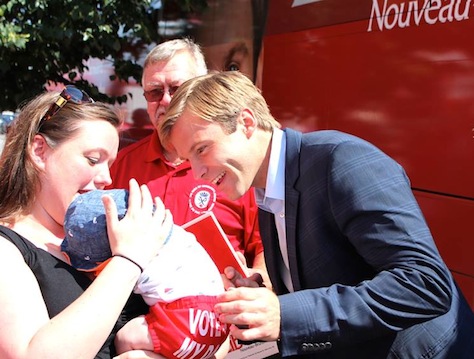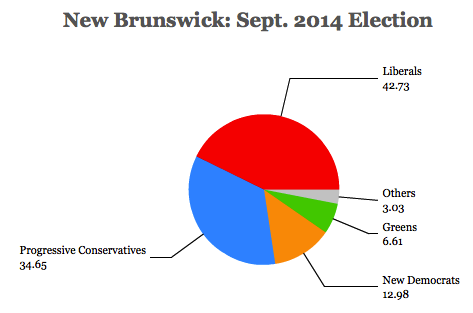The cardinal rule of political prognostication in Canada is that provincial results can provide no guarantee of future performance.![]()
![]()
Nevertheless, Justin Trudeau must be feeling pretty good this week about the Liberal brand throughout Canada, after a strong Liberal victory in New Brunswick, the fourth consecutive Liberal triumph in provincial elections since Trudeau won the federal leadership in April 2013.
The New Brunswick victory follows a rout in Québec, where the Parti libéral du Québec (Liberal Party, or PLQ) won April elections under the leadership of former health minister Philippe Couillard, after just 18 months in opposition. It also follows elections in Ontario, where the provincial Liberal Party won a fourth consecutive term and a majority government under premier Kathleen Wynne in June.
Those follow a landslide victory last October in Nova Scotia and a come-from-behind win by the incumbent Liberals under premier Christy Clark in British Columbia last May.
The Liberal Party last came to power in New Brunswick in 2006 when voters narrowly ousted two-term premier Bernard Lord, oft-mentioned in the early 2000s as a potential Conservative prime minister. But in 2010, voters turned against the Liberals and premier Shawn Graham after an ambitious four-year program designed to improve energy, education and health care.
On Monday, however, New Brunswick’s voters rejected the Progressive Conservatives and premier David Alward. Under the leadership of the 32-year-old Brian Gallant (pictured above), who was just two years old when Trudeau’s father, Liberal premier Pierre Trudeau, left office in 1984, the Liberals have now returned to power. Liberals gained 14 seats to hold a total of 27 in the province’s legislative assembly, to just 21 for the center-right Progressive Conservatives and one for the Green Party’s leader David Coon, a historic breakthrough for a party whose two members of the Canadian House of Commons come from British Columbia.
Gallant, who was predicted to win the September 22 election, despite polls showing a narrowing race in the days leading to the vote, promised to deliver more jobs and better roads and other provincial infrastructure.
All major parties, including the Liberals, supported the Energy East oil pipeline, which would link Albertan and Saskatchewan oil fields to Saint John, New Brunswick’s largest city on the southern coast along the Bay of Fundy. But while Alward vocally championed the development of shale gas exploration and ‘fracking’ within New Brunswick during the campaign, Gallant opposed fracking and, along with the Greens, supports a moratorium on fracking — for now.
An attorney first elected to the legislative assembly last year, Gallant’s climb parallels Justin Trudeau’s own meteoric rise to the leadership of the federal Liberal Party. Gallant, a bachelor, is native of Moncton, the city that anchors New Brunswick’s largest metropolitan center. That also made him the only party leader actually born in the province, with roots in both the French-speaking and English-speaking communities of New Brunswick.
Gallant lost his first attempt to win a seat to the legislative assembly by a 14% margin in the Moncton East riding, when he challenged Lord in the 2006 election. Nevertheless, he won the Liberal leadership in 2012 against fellow Moncton native Michael Murphy, a former provincial attorney general and justice minister.
He will join a long line of young New Brunswick premiers, however, including Lord, who was just 33 in 1999 when he first won the office, and former Liberal premier Frank McKenna, who was just 39.
Trudeau congratulated Gallant on his victory, which focused heavily on province-level issues, including its troubled economy. New Brunswick, like Nova Scotia and Prince Edward Island, rank among the lowest per-capita GDP among Canadian provinces — in 2012, New Brunswick’s per-capita GDP was just $41,700, compared to a national average of $52,200. The province, with just over 751,000 residents, is one of the most bilingual within Canada, with around 66% of the population speaking English as a first language and around 32% speaking French.
There are reasons not to draw too many inferences, of course. Liberals won much of their support from Francophone ridings, while the Tories won theirs from Anglophone ridings. Fracking won’t likely make the top 20 list of issues that will dominate next year’s federal campaign. (And if it did, it might manifest itself in the form of how Canada should accelerate its energy development, not in the form of whether to place a moratorium on it.) Moreover, for two hours, the New Brunswick vote count stalled due to a technical glitch that kept voters on seat’s edge until the wee hours of the morning, when the Liberals took a six-seat advantage.
To the extent that the Progressive Conservatives narrowed the race during the campaign by emphasizing Gallant’s errors and relative lack of experience, it could be a template for the case against Trudeau’s own light resume in next year’s elections.
The federal Liberals, however, must be incredibly heartened by the strength of the Liberal name from the Pacific coast to the Atlantic, through the two largest provinces of Canada, Québec and Ontario.
With a growing national lead, the most recent September 12 Ipsos Reid poll showed that Trudeau’s Liberals have 38%, leading the Conservatives of prime minister Stephen Harper, with 31%, and the progressive New Democratic Party, with 23%, falling back to third place after edging out the Liberals to become the official opposition in the 2011 election.
Canada must hold its general election on or before October 2015.

